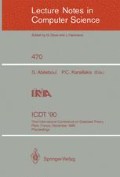Abstract
In object oriented database languages and in languages supporting the semantic data model the construct used to collect sets of homogeneous entities is usually enriched with the possibility of imposing a set-inclusion relation among different collections. We call “class” such a data structure characterized by its ability of collecting values and of being in a containment relation with other classes. In many languages the class notion is not realized by a first class data type but is defined in some special way and the definition of a class is overloaded with constraints, and tightly linked to the definition of types. In this paper we embed in a strongly typed language with type inclusion a basic, but powerful, notion of a class data type which is just a first class data type orthogonal to the other notions of the language. In this context we study one of the most problematic issues in class data types, migration of objects from superclasses to subclasses.
This work was carried on with the partial support of Selenia, project “Very Large Knowledge Bases”, of E.E.C., Esprit Basic Research Action 3070 FIDE, and of Italian C.N.R., P.F.I. “Sistemi informatici e calcolo parallelo”.
Preview
Unable to display preview. Download preview PDF.
References
Albano A., L. Cardelli and R. Orsini, “Galileo: a Strongly Typed Interactive Conceptual Language”, ACM Trans on DataBase Systems, Vol. 10, No. 2, 1985.
Albano A., G. Ghelli and R. Orsini, “Galileo Version 2.0 — user manual”, Università di Pisa, Italy, 1988.
Bruce K.B. and G. Longo, “A Modest Model of Records, Inheritance and Bounded Quantification”, to appear on Information and Computation, 1990.
Cardelli L., “A Semantics of Multiple Inheritance”, Inf. and Comp., 76, 2–3, 138–174, 1988, first published in Semantics of Data Types, G. Kahn, D.B. McQueen and G. Plotkin Eds., LNCS 173, Springer-Verlag, 1984.
Cardelli L., “Amber”, Combinators and functional programming languages, Proc. of the 13th summer school of the LITP, Le Val D'Ajol, Vosges (France), 1985, LNCS 242, Springer-Verlag, 1986.
Cardelli L. and P. Wegner, “On understanding types, data abstraction and polymorphism”, ACM Computing Surveys, vol 17 n.4, Dec. 1985.
Cardelli L., J. Donahue, L. Glassman, M. Jordan, B. Kalsoff and G. Nelson, “Modula-3 report (revised)”, SRC Research Report 53, Digital Equipment Corporation, Palo Alto, CA, 1989.
Curien P.L. and G. Ghelli, “Coherence of Subsumption”, Technical Report TR-34/89, Dipartimento di Informatica, Università di Pisa, Pisa, Italy, 1989. To appear on Mathematical Structures in Computer Science.
Dahl, O., and K. Nygaard, “Simula, an Algol-based Simulation Language”, CACM vol. 9, 1966.
Milner R., “A theory of type polymorphism in programming”, Journal of Computer and System Science 17, 1978.
Author information
Authors and Affiliations
Editor information
Rights and permissions
Copyright information
© 1990 Springer-Verlag Berlin Heidelberg
About this paper
Cite this paper
Ghelli, G. (1990). A class abstraction for a hierarchical type system. In: Abiteboul, S., Kanellakis, P.C. (eds) ICDT '90. ICDT 1990. Lecture Notes in Computer Science, vol 470. Springer, Berlin, Heidelberg. https://doi.org/10.1007/3-540-53507-1_70
Download citation
DOI: https://doi.org/10.1007/3-540-53507-1_70
Published:
Publisher Name: Springer, Berlin, Heidelberg
Print ISBN: 978-3-540-53507-2
Online ISBN: 978-3-540-46682-6
eBook Packages: Springer Book Archive

